The rollercoaster of a relationship between the world’s richest man Elon Musk and President Donald Trump has captivated the attention of many political observers over the last yeah, but Musk’s latest move could be his boldest.
Musk officially filed a Statement of Organization Sunday with the Federal Election Commission for his ‘America Party’ political party after weeks of threatening the GOP.
On July 4th, Musk asked his 221.7 million followers on X if it is time to make good on his threats to create a new political party and oust the Republicans who supported Trump’s signature budget bill which narrowly passed through Congress after weeks of debate and different factions of the GOP plotting to the tank the legislation as various points the process.
‘One way to execute on this would be to laser-focus on just 2 or 3 Senate seats and 8 to 10 House districts,’ he wrote on X.
‘Given the razor-thin legislative margins, that would be enough to serve as the deciding vote on contentious laws, ensuring that they serve the true will of the people.’
Republicans currently hold slim majorities in both the House and Senate with just a handful of seats giving them the edge over Democrats.
Out of 100 seats in the U.S. Senate, 53 are held by Republicans. In the U.S. House of Representatives, 220 seats are held by Republicans and 212 are held by Democrats with three seats presently vacant due to members passing away.
Trump’s budget bill passed with narrow margins in both chambers last week, with some members of the President’s party voting against the legislation.
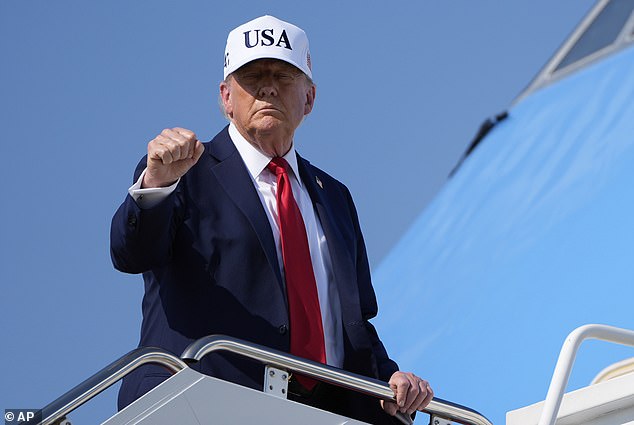
President Donald Trump gestures as he boards Air Force One, Thursday, July 3, 2025, at Joint Base Andrews, Md.
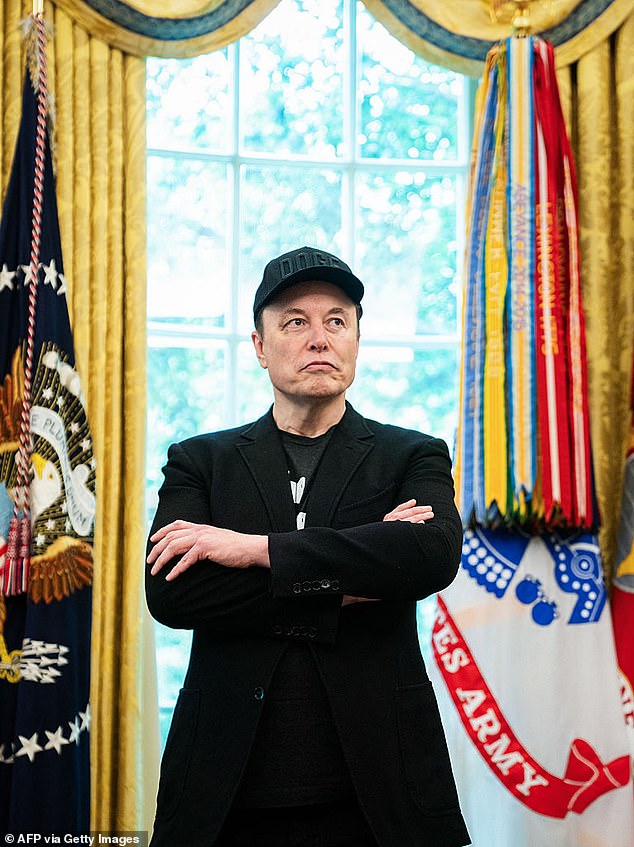
Elon Musk looks on during a news conference with US President Donald Trump in the Oval Office of the White House in Washington, DC, on May 30, 2025. Musk, who stormed into US politics as President Trump’s chainsaw-brandishing sidekick, announced on May 28 that he is leaving his role in US government, intended to reduce federal spending, shortly after his first major break with the President over Trump’s signature spending bill
In the Senate, the vote was 51-50, with Vice President JD Vance casting the tie-breaker. Republican Senators Susan Collins of Maine, Rand Paul of Kentucky, and Thom Tillis of North Carolina joined Democrats in opposing the bill.
In the House the vote was 218-214. Republicans Thomas Massie of Kentucky and Brian Fitzpatrick of Pennsylvania voted no.
Musk and Trump got into a social media war during debate on the legislation, leading to Musk threatening to use his billions to start a third political party and Trump threatening to deport the naturalized American citizen.
Last Monday before Trump’s bill even passed, Musk escalated his attacks, saying lawmakers who campaigned on cutting spending but supported the bill ‘should hang their heads in shame.’
‘And they will lose their primary next year if it’s the last thing I do on this Earth,’ Musk declared.
The Tesla and SpaceX CEO also called for a new political party, arguing the bill’s massive spending showed ‘we live in a one-party country — the PORKY PIG PARTY!’
‘Time for a party that actually cares about the people,’ he wrote.
‘If this insane spending bill passes, the America Party will be formed the next day,’ Musk pledged in a post on X Monday evening.
Musk, now worth over $400 billion, founded the AmericaPAC super PAC in 2024.
AmericaPAC raised more than $260 million last year, much of it to back Republicans in swing districts. Over $88 million went to supporting Trump directly.
The Senate version of Trump’s bill, which also passed the House on Wednesday, is estimated to add between $3.3 billion and $4.5 billion to the national debt.
‘The insane spending of this bill increases the debt ceiling by a record five trillion dollars,’ Musk posted.
Despite the relative unpalatability of a national third party or independent presidential campaigns, state level races are another story.
There is precedent for a third-party candidate running in place of a major party candidate, and some have even won.
Two seats in the U.S. Senate are presently held by Independents, although those independents caucus with Democrats.
Dozens of members of the U.S. Senate have been elected outside of the two major parties throughout the chamber’s history.
In one other relatively recent example, Independent Greg Orman ran against former GOP Kansas Senator Pat Roberts, albeit unsuccessfully in 2014.
Orman managed to pull in 42.5% of the vote as the Democrat party did not field a candidate in the race.
Musk was curiously silent in the hours following the congressional vote on Trump’s budget bill but, on July 4th, he decided to weigh in: ‘Great day for some … fireworks,’ he wrote, adding two fire emojis.
He also praised Republican Senator Rand Paul and Republican Congressman Thomas Massie, both of Kentucky, for voting against the bill for the amount of money it added to the country’s deficit.
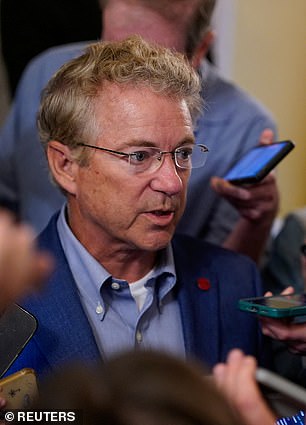
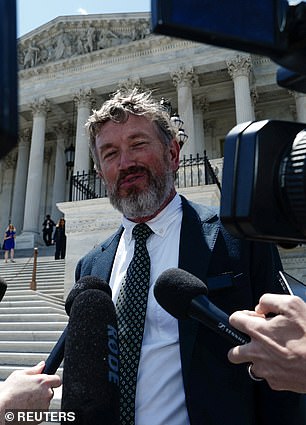
Musk praised Republican Senator Rand Paul and Republican Congressman Thomas Massie, both of Kentucky, for voting against the bill for the amount of money it added to the country’s deficit
‘100,’ the world’s richest man wrote using an emoji in support of them.
Musk has previously threatened to primary any GOP lawmaker who voted in favor of Trump’s signature legislation.
Two Republican lawmakers who spoke to the Daily Mail on Thursday brushed aside Musk’s potential threats against GOP members who voted for the big beautiful bill.
Rep. Ralph Norman (R-S.C.), a member of the conservative House Freedom Caucus brushed off Musk’s threats when asked if he thought any members of his conference were worried about any potential retaliation from Musk for their vote.
‘No, Elon Musk is for the country. No retaliation’ Norman stated.
Asked again if he thought his fellow Republicans could get primaried with millions of dollars flowing from Musk, Norman added the following.
‘Elon Musk is a true patriot. He identified where our tax money went. For you, young people, you ought to be grateful that we had him.’
‘No one else had the bandwidth to do what he did,’ Norman noted, referring to Musk’s work as Trump’s former lead of the Department of Government Efficiency.
Musk directly called out a pair of House Republicans who are a part of the conservative ‘Freedom Caucus,’ for their votes to pass the preliminary House version of the bill back in May.
‘How can you call yourself the Freedom Caucus if you vote for a Debt Slavery bill with the biggest debt ceiling increase in history? @RepAndyHarrisMD @chiproytx,’ Musk wrote, addressing the two GOP lawmakers directly.
Another conservative Republican, Representative John McGuire (R-Va.) told the Daily Mail that he believes Musk is going to move on ‘bigger and greater things.’
‘I think yesterday, he said more nice things about President Trump,’ McGuire added, referring to a recent positive post Musk’s made on X, formerly Twitter.
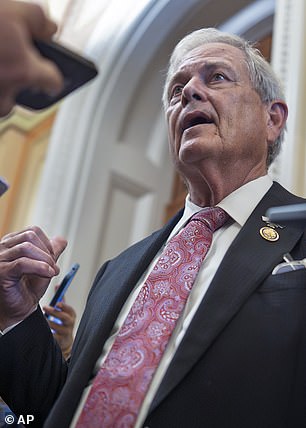
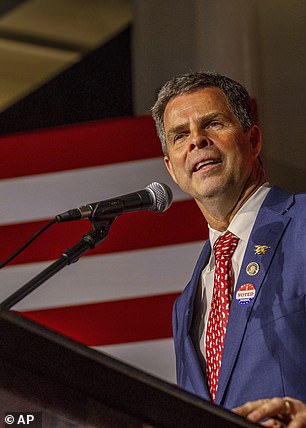
Representatives Ralph Norman and John McGuire spoke with the Daily Mail Thursday after Trump’s budget bill passed through Congress.
In that post, Musk praised Trump’s peace making abilities.
‘Credit where credit is due. Donald Trump has successfully resolved several serious conflicts around the world,’ Musk wrote in a post made at around 1:30 AM Wednesday.
McGuire is no stranger to competitive GOP primaries in red seats, as he himself came to Congress after he primaried former Rep. Bob Good, a fellow Republican from the right last year.
While members of Congress brushed off Musk’s threat’s and even further political involvement following the passage of Trump’s bill, some of the President’s business allies are willing to to go scorched earth on the billionaire.
Venture capitalist James Fishback – whose Azoria 500 ETF invests in companies that don’t engage in DEI practices – posted on X that he was withdrawing support for Tesla and Elon Musk. Fishback noted that his firm ‘decided to postpone next week’s public listing of our Azoria Tesla Convexity ETF.’
Fishback added that his organization’s ‘decision comes in direct response to Elon Musk’s announcement that he is launching a new national political party.’
While nearly all Republicans backed the budget, two conservative lawmakers from Kentucky — Rep. Thomas Massie and Senator Rand Paul — voted no.
Massie was already criticized by the Trump White House for opposing the bill, and Musk defended him even before the final vote.
It remains to be seen whether Musk’s support for Massie was an exception, or a sign he’s prepared to oppose Trump in future primaries within the GOP or even have a greater impact with his own political party in its entirety.












